Living The Zen Life As A Foreign Woman In An Old Akita Temple
One Woman's Journey Of Marrying Into A Japanese Temple Family
When Gretchen Miura married into a Buddhist temple family 17 years ago, she knew that she was about to embrace a completely foreign culture and bear the responsibility of continuing a centuries-old tradition. She didn't know, however, that with time, she would influence this tradition in ways that only she could. Here's her story.
American Gretchen Miura lives in the picturesque Oga Peninsula in Akita Prefecture with her Japanese husband and four children. The family presides over Dairyuji, a beautiful temple with 800 years of history, which now Gretchen and her family manage. Savvy Tokyo catches up with Gretchen to learn more about her unusual lifestyle, how she strives to honor the traditional side of temple life while bringing her own fresh perspective and initiatives, and what prompted her to start organizing weekend retreats at the temple in English.
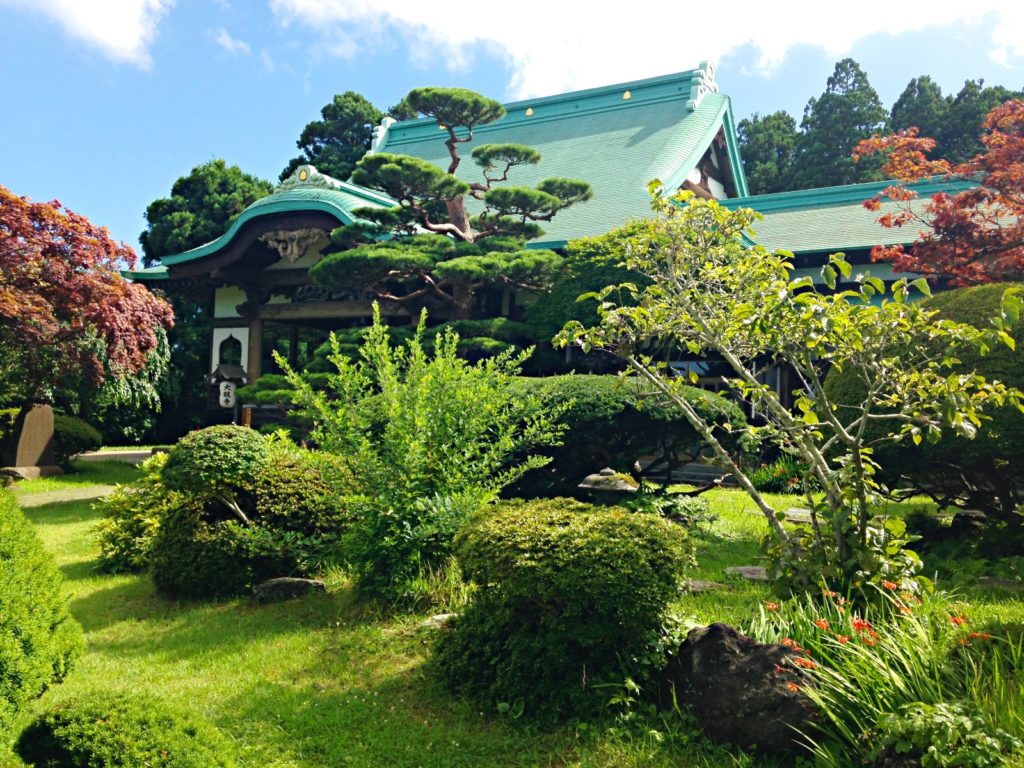
Dairyuji, Miura family’s temple is located on the beautiful Oga Peninsula in Akita Prefecture.
Did you know from the beginning that if you married your husband, you would have to embrace this lifestyle? Did you have to give it a serious thought, or was it more a matter of jumping in and trusting that love would get you through?
I definitely thought it over long and hard, but probably still romanticized it. While I was aware that marrying my husband would mean playing a role at the temple, there was no way to fully understand everything this lifestyle would encompass. As with any marriage, there was an element of trust and just going for it, but yes, it felt like I jumped off a cliff!
Please tell us a little about the history of your family temple and the function it plays in the lives of the people who you serve.
Dairyuji is a Zen temple with an 800-year-long-history. There have been several fires and relocations over the centuries, so the current main buildings are about 100 years old. We have 450 multi-generational families as members. Ceremonies are regularly held at the temple to celebrate events such as the spring equinox, Buddha’s birthday or the New Year. My husband performs funerals and memorial services, and he visits each member’s home once per month to chant for their ancestors. Obon is a major holiday which is a very busy time for the temple. We also hold community events like concerts, markets and yoga.

A temple with a view: Oga Peninsula’s stunning sights are enough to heal us from our hectic daily lives.
What is a “typical day” in the life of Gretchen Miura?
How about a “typical week”? I spend a couple of days at the temple helping with a variety of things such as ceremonies, large groups of visitors or meetings. One day a week is dedicated to office work, planning events, updating social media and our website, reaching out to other temples and continuing my own education in Buddhism and mindfulness. In the remaining days, I sew and manage my online shop SORAbento where I sell handmade bento bags, totes and other items. My weekends are packed full of kid activities. My day officially starts after my kids leave for school and I have a cup of coffee while reading the newspaper. I spend way too much time in the car driving kids around in the afternoons, but we make an effort to eat dinner together at home. I love indulging in Netflix at night, usually staying up past my bedtime!
While I was aware that marrying my husband would mean playing a role at the temple, there was no way to fully understand everything this lifestyle would encompass.
You’re one very active lady! How do you manage to fit everything into your busy lifestyle?
The women in my life are incredible and I find a lot of comfort by turning to them for support and inspiration. My mother-in-law has been very patient in allowing me to come into my role at the temple on my terms. She has gradually been showing me the ropes and we have fallen into an easygoing relationship. Despite making everything look effortless, I am very aware of how hard she works and have a tremendous amount of respect for her.
As an introvert, it is important for me to take time to recharge. My home is my happy place, but I can let things slide if need be and my kids help with laundry and other chores because otherwise I would go mad! My husband is a great partner and we tackle things together.
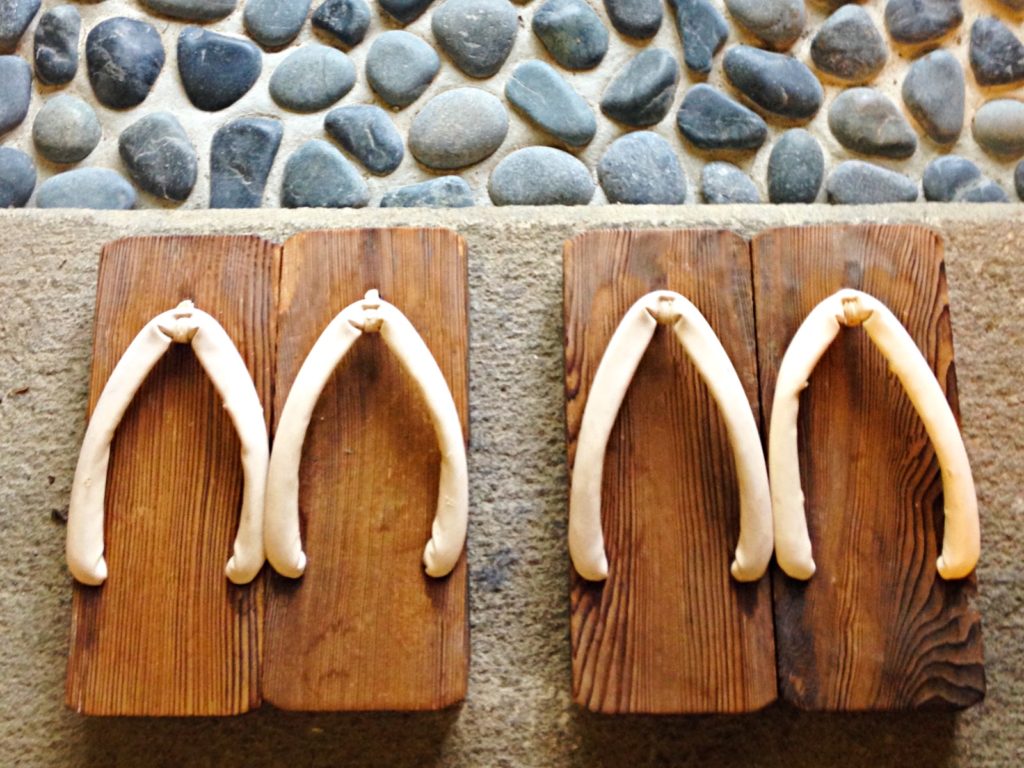
A team of two: Gretchen says that while not everyone understands it, she and her husband are a team and they make an effort to show what a modern and equal relationship looks like.
You must have faced some challenges, taking on a role that even most Japanese know little about. What have been the hardest things and how did you overcome them? Are there any things with which you still struggle?
For years I felt completely incompetent and out of place. I constantly made mistakes and grew quite disenchanted. Despite most people being genuinely kind and welcoming to me, I gave the critics more influence over me and often felt judged and scrutinized. I distanced myself from the temple, only reluctantly helping when absolutely necessary. It was overwhelming to adjust but slowly, I learned to reach out for help and trust people more. I joined a group of local priest wives and was relieved to find out that indeed even Japanese women have no idea what to do at a temple without guidance! While I still have a lot to learn, I have become much more comfortable at the temple in recent years.
It was overwhelming to adjust but slowly, I learned to reach out for help and trust people more.
I also resist being pigeonholed into such a traditional role as a woman. At times it is incredibly challenging, but I see it as an opportunity to provide an alternative image of what a priest’s wife can do. While not always appreciated by everyone, my husband and I are a team and we make an effort to show what a modern and equal relationship looks like. I have been publicly criticized for this, but I think of my children and how I want them to see me, which is all the motivation I need.
What aspects and achievements have brought you the greatest pleasure and satisfaction?
My greatest sense of accomplishment is in bringing more awareness to the importance of meditation and mindfulness. When I first moved here I was surprised by how temples primarily focused on ceremonies and funerals. Both are integral, but it seemed odd that the practice of meditation, which is the very essence of Zen Buddhism, was effectively non-existent. I encouraged my husband to begin leading meditation sessions and it has been inspiring to see the positive reaction from the community. Now I am taking on a more active role in creating longer mindfulness afternoons and weekend retreats. I am also studying to become a mindfulness teacher myself, which is extremely rewarding for me.
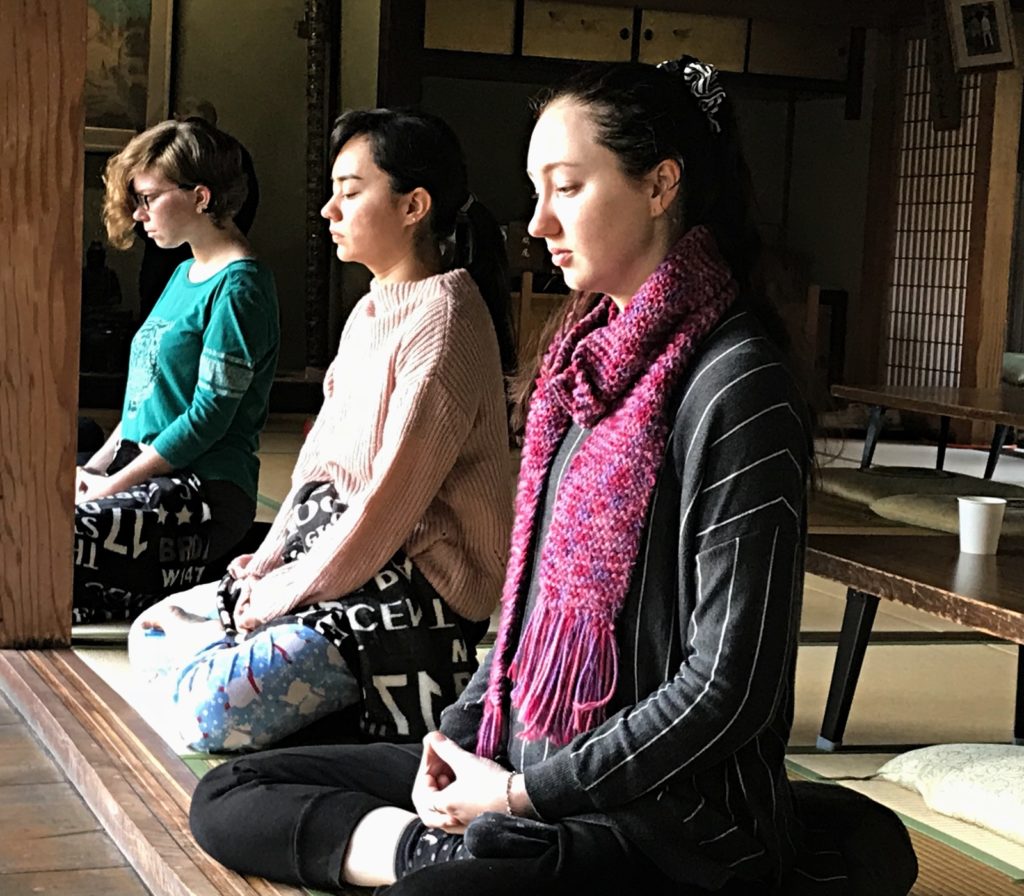
Dairyuji strives to become a place where people meet, meditate, share their personal journeys and grow together in compassion and understanding.
Community outreach is a major part of your work at the temple. What kinds of things are you and your family doing?
My husband is incredibly involved in the community, supporting local businesses and volunteering much of his time at places such as hospice care centers and schools. It has been exciting that so many people have attended our monthly Mindfulness Days, which I started earlier this year. I am happy to see how this time spent together also draws the community together.
As a non-Japanese, you are in a position to introduce a unique perspective. Please tell us about the initiatives you’ve been working on.
The most exciting development is that we are hosting weekend Mindfulness Retreats in English, with the next one taking place on June 1st to 3rd, followed by another in late October. Through meditation, people can learn mindfulness techniques to incorporate into their daily lives. Participants spend two nights at the temple sleeping in traditional tatami rooms. We offer a variety of activities ranging from a cooking workshop, an excursion up around the stunning coastline and watching a Namahage drum performance. We will also have a dharma talk in which we discuss an element of Buddhism and share some personal experiences. We encourage everyone to reconnect with themselves. There is also plenty of downtime to enjoy the natural beauty of the temple grounds or to relax with a cup of herbal tea. We are also collaborating with small, local business to provide delicious and healthy meals. Everyone leaves feeling amazing!
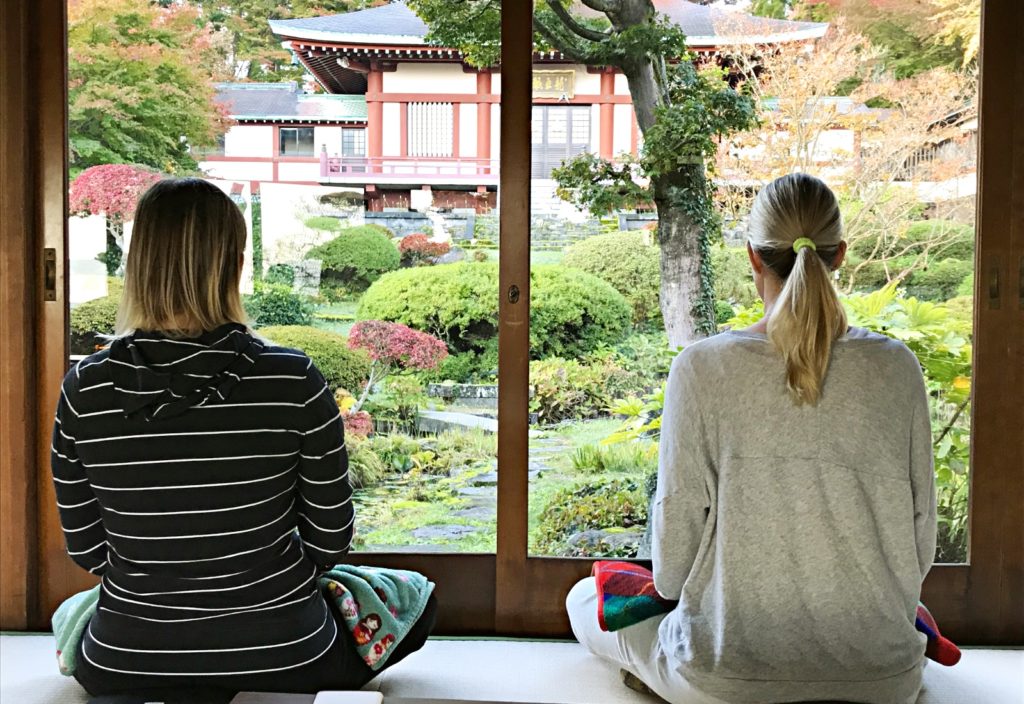
Guests enjoy the peace and quiet during a weekend Mindfulness Retreat at Dairyuji.
The retreats sound fantastic! What do you want participants to take away from them and what has the feedback been like so far?
We want to create a welcoming environment for anyone with any background or level of experience, where people leave feeling reinvigorated and of course, more mindful. It is also a chance to highlight what we love about our community while giving participants an inside look into this traditional way of life. The past retreat participants have remained friends of ours and have even come back for visits and meditation sessions. I am hoping to create a community of people dedicated to their mindfulness practice, which is called a “sangha” in Buddhist circles. We all need support and a sense of belonging. By connecting and contributing to the sangha, ideally, Dairyuji can become a place where we meet, meditate, share our personal journeys and grow together in compassion and understanding.
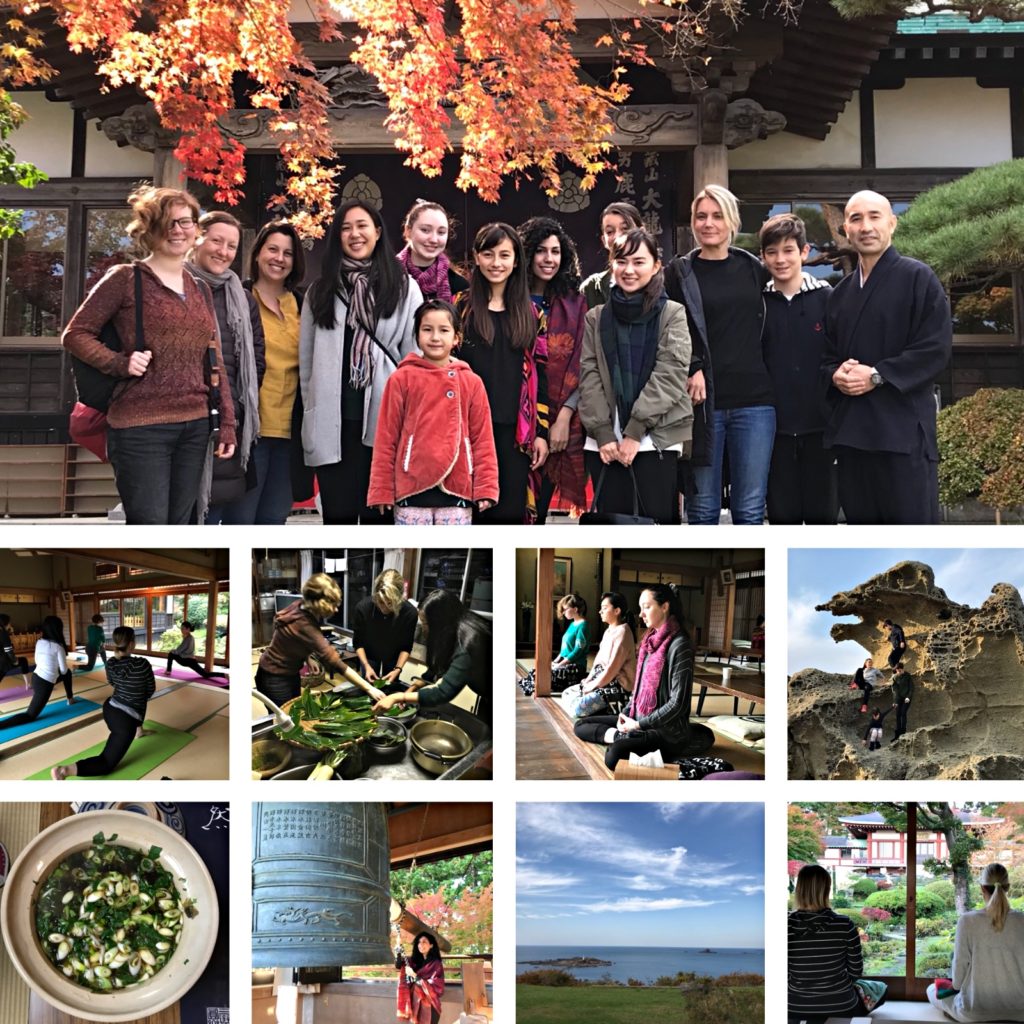
Dairyuji’s Mindfulness Retreat includes a weekend full of various cultural and relaxation activities, meditation and great local food.
Staying relevant in a rapidly changing world must surely be a challenge for a family business entrenched in ancient rituals. What role do you think your temple will play in the future lives of the people in your community?
This is precisely one of the main reasons I wanted to run the retreats. We live in a small rural town with a shrinking population, so I am looking for ways to keep the temple thriving while supporting the local community. It is definitely a challenge to stay relevant in our ever-changing society, but it is our job to keep one foot deeply grounded in tradition and one foot in line with people’s current priorities. Despite an image of being unchanging, temples are constantly evolving. For example, my husband is only the third generation of priests being allowed to marry. In modern history, people primarily visit temples for funerals, memorials or Obon, but that is beginning to change. I find it exciting that there is a growing interest in practices such as mediation, for example.
[I]t is our job to keep one foot deeply grounded in tradition and one foot in line with people’s current priorities.
The art of tracing Buddhist text or sutras, called “shakyo,” has recently become quite popular. Many young people visit temples with friends to try shakyo, which is a form of creative contemplation in itself. I see this as an advantage. People are searching for authentic connections. There is a need in our often-hectic world for a quiet, sacred space where people can have a moment of peace. One of my deepest desires is to create an inviting atmosphere where people feel comfortable and can find what they are needing at that moment.
As a foreign woman very much involved in a traditional role and lifestyle, how do you achieve a balance between Gretchen the temple wife and Gretchen the American woman? Any hints for readers on balancing two quite different aspects of yourself?
This is tough and I have struggled in the past finding the right balance between these two divergent parts of myself. It can be incredibly difficult to find your place in a foreign country. Luckily, my work with mindfulness has brought me back to my true self. Running these retreats allows me to contribute in a meaningful way that reflects my interests and skills. I make an effort to be respectful and aware of my environment, but I also figured no one benefits by me “pretending” to be Japanese. Hopefully, I can bring something fresh to the table as an American woman. I want to use the potential of what could be a limited traditional job and turn it into a more progressive role that doesn’t alienate the American side of myself. It ultimately comes down to aligning your passion with your lifestyle and recognizing that different aspects of yourself are not in conflict, and can in fact coexist.
What do you see ahead for yourself, your family and your temple?
I am actually going on a retreat for mindfulness educators myself this summer. I am eager to collaborate more with international Zen centers and do more outreach. Our children are growing up quickly and it is wonderful seeing them follow their own dreams. I think the temple will continue to play dual roles by maintaining the traditional rituals and ceremonies, as well as looking to support the community in ways that resonate with their needs.
If you’re interested in Dairyuji’s Mindfulness Retreats, see more details of how to book and get there on the temple’s official website. The next retreat takes place from June 1st to 3rd, followed by another one in October.
The Deets
Where: Toriyaba-34 Funagawaminato Funagawa, Oga-shi, Akita Prefecture













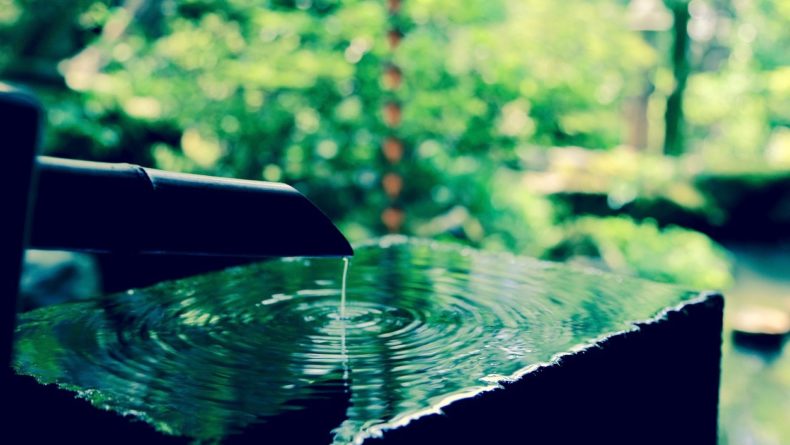
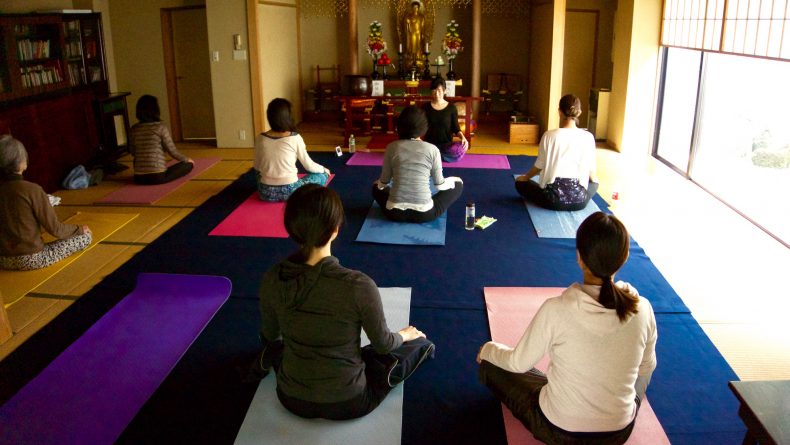
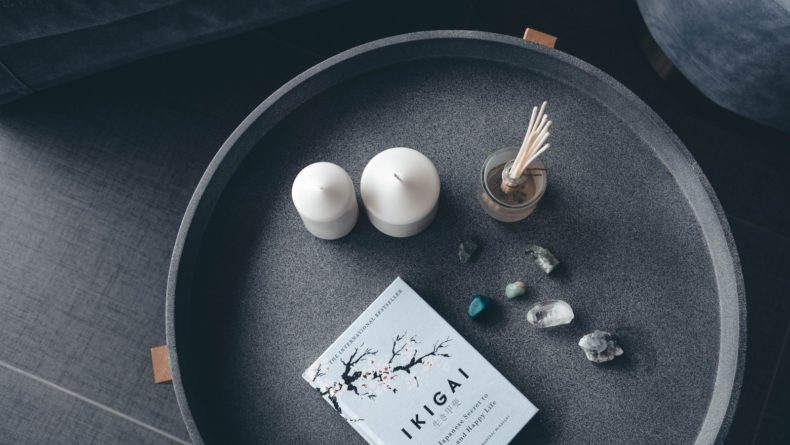
Leave a Reply